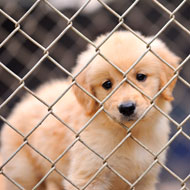Did you see his mother?

“We are responsible if we fail to do something to prevent an animal suffering harm, even if we are not directly in charge of that animal or in control of it”.
Sometimes, facts and figures published in isolation have a limited impact yet, when taken together, can represent a cogent call for veterinary professionals to step up to the plate and take action.
Such is the case with the illegal importation of pet/exotic animals, the sale of pets via online advertising, and the ignorance – wilful or otherwise – shown by pet owners as to their legal responsibilities to the pets they own.
Figures released earlier this year by the Animal Health and Veterinary Laboratories Agency (now called the Animal and Plant Health Agency) showed that 376 dogs were stopped coming through the ports in 2013 because of non-compliance with the Pet Travel Scheme (PETS), compared to 96 in 2011.
Then, only a few days ago, a letter to the Veterinary Record (Vol 175, No 17) described a case of distemper in a bitch that had been imported from Bulgaria. Its writers stated: "While the risk of introducing rabies by this mechanism is clearly of major concern, the authors wish to highlight the possibility that importation of dogs, whether controlled or illicit, has the potential to reintroduce other infectious diseases that are currently considered to be rare in the UK, unless suitable controls and checks are implemented."
These risks are greatly enhanced by the exponential growth in unscrupulous online advertising of pet and exotic animals, something that is now being addressed in a more cohesive manner by the Pet Advertising Advisory Group (PAAG). In the absence of the Government’s willingness to legislate in this area, the PAAG is seeking innovative solutions to combat the problem and is looking to the veterinary professions to be much more proactive in helping it blow the whistle on cases of malpractice.
In the busyness of everyday practice life, there is a natural temptation to bury our heads in the next case and to devolve responsibility to others – invoking the classic ‘they’ who ‘should do something about it!’ Why should I care where the puppy came from?
In his presentation to veterinary nurses at the BVNA Congress, RSPCA chief vet, James Yeates, pointed out in no uncertain terms the legal responsibilities that pet owners and veterinary professionals have towards the welfare of animals committed to their care, no matter how indirect or tenuous that connection might at first appear.
“We have a duty not to harm and we are responsible if we fail to do something to prevent an animal suffering harm, even if we are not directly in charge of that animal or in control of it,” he said. “Vet nurses have an increased duty of care; and by taking on their professional role are more aware of welfare issues and take on additional legal and moral responsibilities.”
It is worth considering how much more could be done to advance the aims of the PAAG in particular, and the welfare of pets across the board, simply by asking the question, “Did you see his (her) mother?” every time we are presented with a new puppy or kitten. And then acting on the answer according to the direction indicated by our moral and ethical compass rather than the clinical convenience of indifference.



 The Federation of Independent Veterinary Practices (FIVP) has announced a third season of its podcast, Practice Matters.
The Federation of Independent Veterinary Practices (FIVP) has announced a third season of its podcast, Practice Matters.